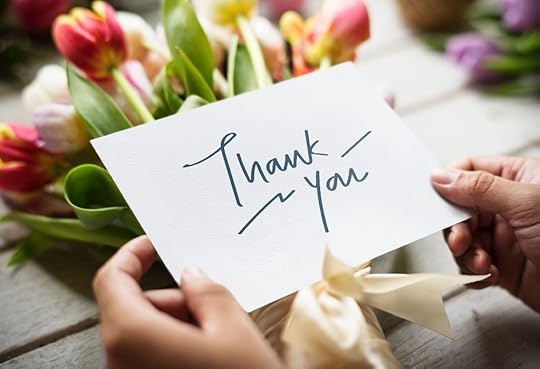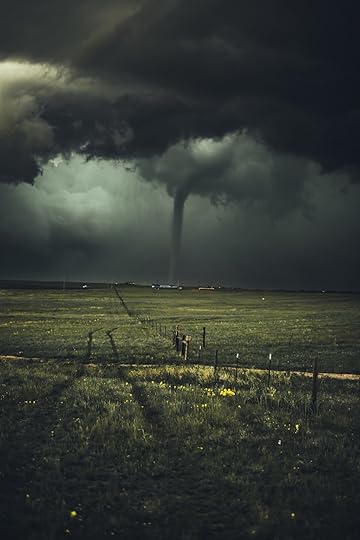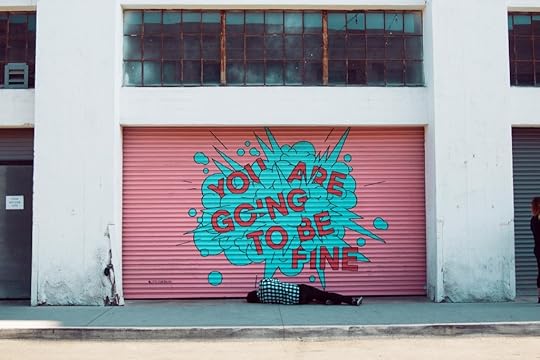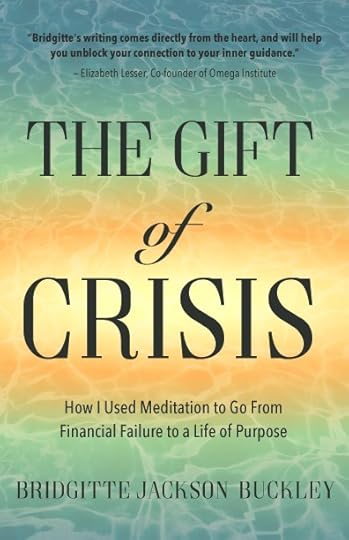Bridgitte Jackson-Buckley's Blog, page 5
October 29, 2018
Thank you! I haven’t heard of Stevenson.
Thank you! I haven’t heard of Stevenson.

September 19, 2018
What Can Negative Feedback on Your Writing Teach You About Yourself?

Just before the start of my favorite time of the year, summertime, I finished writing my first book, The Gift of Crisis: How I Used Meditation to Go From Financial Failure to a Life of Purpose. Following a brief period of adjustment to having accomplished such a huge undertaking, I planned to bask in the glory of having finished the book, sit outside and watch butterflies fly around me, eat tons of ice cream and then start on a ghostwriting writing project. I was proud of myself, confident, excited, and ready to welcome summer and move on to new projects. I expected the months prior to publication to be a period of calm creative bliss.
This is not what happened.
What did happen was nothing less than shocking, stressful, and yet amazingly revealing.
With anticipation to bring an impactful story to life, I was extremely excited to take on the ghostwriting project. After several meetings, interviews, discussions and thorough conversations, I felt I had a clear understanding of the direction of the book, concepts to address, details pertaining to specific events, and the tools readers would learn from the book.
I began to write the Introduction. After spending a considerable amount of time working on it, I felt good about the first draft. I set it aside and moved onto Chapter 1.
Chapter 1, however, was an entirely different “beast”. There was a lot of information to transcribe, sift through, structure and adequately place within the story, including several events that occurred over a period of time, of which I thought I had in the correct order of sequence.
Unfortunately, the sequence of events in Chapter 1 were not in the correct order. The timeline was completely out of kilter. And when we met to review the first drafts, it was a disaster.
As we sat and began to read through the first drafts, I was ready with ears primed and prepared to hear, “Oh this is wonderful.”
I should have known something was wrong when the silence extended way beyond a normal period of silence.
For the next hour or so, while pages and pages of both the Introduction and Chapter 1 were read with nothing less than shocking dismay and disapproval, all I could do was sit there in silence, with a slightly agape mouth and listen to what was said.
I sat quietly, with the “deer in the headlights” look and listened to the comments and barrage of rhetorical questions:
“Did you read this? Does this make sense to you? Why is this here? What about the other part? Why isn’t that information included? What am I going to do?! How can we possibly fix this?!”
I have never experienced anything like this in my professional life.
Throughout the most uncomfortable professional situation I have ever been in, I sat quietly and responded to the comments and rhetorical questions with poise and calm. I didn’t argue and I didn’t try to defend myself. I respectfully and patiently gave my perspective and explained that I thought the sequence of events were correct.
Despite being completely overwhelmed with the negative response, part of being a professional is to receive feedback in a way that is constructive. I had to quickly get in the right mental and emotional space to look at my work with a critical eye. I thought, ‘Put you big girl pants on, Bridgitte, and get it together.’ Once the sting of the negative response dulled, I listened to e-v-e-r-y single concern and comment with willing attentiveness to honestly contemplate the following questions:
Why is this being said about the Introduction?Does this response have merit?Is this substantive criticism?What did I miss to end up to so far away from the goal?What can we do right now?After sometime things calmed down. I began to make suggestions to address the concerns. As we went through the Introduction, I could see the merits of the negative feedback. I had left out major points that should have been addressed in the Introduction. It was too vague and failed to adequately address key topics in the book.
Roughly seven hours later, we made significant progress to get the sequence of events in order in Chapter 1, and thoroughly reviewed the pertinent points to include in the Introduction.
If you are a writer, it is hard to sit and listen to someone tell you what you’ve written is essentially the worst thing they have ever read, especially if you are a soon-to-be published author. Such a situation can bring up issues surrounding shame, humiliation, criticism and unworthiness — things no one really wants to talk about.
For several years, I have made an effort to continually bridge a spiritual practice with my daily life to achieve self-improvement through a better understanding of myself. I consistently engage in contemplative practices such as: meditation, prayer, journaling, self-introspection and reading. And it is from my spiritual practice that I have learned sometimes the best “teachers” hide in experiences that are the most difficult.
Uncomfortable experiences, like the negative writing feedback, are some of the best experiences for us to learn from. These experiences can bring unresolved wounds and self-sabotaging beliefs to our attention. They can help us make peace with unresolved parts of ourselves and learn something about ourselves.
There was a time in my life when I would have been crushed, absolutely crushed, to be criticized or told I had failed to live up to an expectation. I would have felt a sunken feeling of shame, fear of failure and embarrassment in my abdominal area that led to days of grief and depression. I would have descended into mental chaos telling myself I screwed up, I’m not good enough and that my writing career was over.
Over the course of the years, my efforts to heal and release the emotional reactions I associated with criticism have been one of the most difficult things for me to do.
But on this occasion, criticism was a blessing in disguise.
A few hours later, as I drove home in my car in silence, I noticed the sunken feeling of shame and humiliation that would normally be present during a moment of criticism, or falling short of someone’s expectations simply wasn’t there.
I thought, ‘Well, this is really interesting.’ I smiled to myself and recognized the gift in this writing crisis has shown me I have grown, I have made peace with shame, criticism and humiliation. Making peace means it will no longer cloud my judgment. Instead of internalizing criticism as a personal attack, I can view it for what it is — an opinion that can be met with patience, tolerance, and compassion.
Criticism and negative feedback can hurt, and may initially bruise the prideful side of the small ego. But it should not instill in you a sense of hopelessness for a task that seems beyond your current abilities. It just means you may need to take a different approach, and that’s exactly what I did.
One week, after revisiting both the Introduction and Chapter 1, we worked together to create a much stronger and cohesive Introduction, as well as a perfectly sequenced Chapter 1. It wasn’t easy and it took a considerable amount of work hours and effort, both neither of us gave up. We may have secretly thought about it, but we pushed through.
I’ve been writing for eight years. That means I’ve made a lot of errors, lots of typos and lots of bad writing. In fact, I’ve failed a lot, but I’ve also learned a few things.
Negative feedback is a tool for improvement, not an indicator to define who you are.
If I wrote the Introduction and Chapter 1 to absolute perfection, I would not have realized I have finally quieted the inner voice that says, “You screwed up again. You’re not good enough,” and I would not have realized how resilient I have become. When you make peace with an unresolved part of yourself, you will still encounter trigger situations, difficult professional experiences or challenging creative projects. But if you are willing to change and grow for the better, you will respond differently and address them in new and creative ways. And by responding differently, you will obtain a different outcome.
It is indeed unavoidable that there will be growing pains, and growing pains are not pleasant. But it is from the pains that you will come to see progress has been made.
 Helping each other write better.
Helping each other write better.
What Can Negative Feedback on Your Writing Teach You About Yourself? was originally published in The Writing Cooperative on Medium, where people are continuing the conversation by highlighting and responding to this story.
September 15, 2018
Wonderful, Brenda! Congratulations to the city of Sacramento! Have a wonderful inauguration.
Wonderful, Brenda! Congratulations to the city of Sacramento! Have a wonderful inauguration.

September 11, 2018
3 Questions to Help You Remain Grounded: No matter what is going on around you
 Photo Credit: Nikolas Noonan
Photo Credit: Nikolas Noonan“And once the storm is over, you won’t remember how you made it through, how you survived. You won’t even be sure whether the storm is really over. But one thing that is certain, when you come out of the storm, you won’t be the same person who walked in. That’s what the storm is about.” — Haruki Murakami
During a storm (crisis), the trees outside are cold, wet and blown about by rain and heavy gusts of winds.
Leaves are blown off the trees (you), some branches bend and some snap (emotional reactions), but the roots remain firmly planted and untouched.
The tree roots (consciousness) absorb the rain water from the soil, while also taking nutrients (useful information) and chemicals (personal interactions) out of the soil (environment) and use them to produce what is needed for the tree’s growth, development, and repair.
Deeply grounded, the roots anchor the tree in the soil, keeping it alive as a steady presence within the storm.
When a storm arises, it is your relationship to the energy of the storm that determines if you suffer or not. You can absolutely change your mind about how you choose to go through the storm, specifically a storm you may have created.
It is not just about being like a tree and standing up straight amidst the storm.
The storm is not there to teach you how to remain straight, which is precisely why the storm can be useful. It is there to teach you how to bend, when to yield; how to meet adversity with strength and flexibility.
When you recognize misplaced emotional reactions you can connect with what is true. A sense of safety and protection are cultivated within you because you begin to trust in a deeper part of yourself.
At some point or another, we all face storms.
The questions then become:
When a storm arises, can you remain centered and connected?In essence, can you remain still?Can you find the gift within the storm (crisis) you can use for growth?An excerpt from The Gift of Crisis: How I Used Meditation to Go From Financial Failure to a Life of Purpose. Now available for pre-order.

August 19, 2018
Absolutely.
Absolutely. Being clear & upfront definitely helps with clarity for feedback. The book proposal is vital in helping you get clear on what you’re aiming to do with the book. It took quite some time to compete the proposal, but it was instrumental in keeping me on track.

August 13, 2018
How to Deal with the Emptiness and Elation of Completing a Creative Project
 Photo Credit: Michael Quinn
Photo Credit: Michael Quinn“I recently finished writing a book. For the first time in years, my weekends, nights, and early mornings weren’t being spent obsessing over finishing a book. So I cleaned the kitchen, did the laundry, tended to the stack of ignored paperwork, and got seriously depressed.”
“I thought the completion of a major project would result in a feeling of elation, but by placing that one last period on the page, I created a vast empty space in my life. I didn’t know what to do with myself, especially the unexpected sensation of feeling lost and depressed. It turns out I’m not the only one who has experienced the post-project-completion blues.”
While writing the book, I had so much to say. I said everything I wanted to say and everything that wanted to be said through me as a creative vessel. But after completing the book, and much to my surprise, it seemed as if I would never have anything else to say about anything. I had no thoughts, no concerns, and no new ideas, just emptiness.
Unlike the aforementioned author, instead of cleaning the kitchen, doing laundry, dealing with paperwork and feeling depressed, after finishing my first book, I drifted into an abyss of mental blankness.
With no writer’s deadline to be mindful of, no lingering ideas swirling around in my head and no immediate desire to say anything else — ever — I, too, felt a vast empty space in my life and sank into a void of lethargy.
I responded to this void by lying on the couch for hours in silence and simply staring out of the window.
During the staring out of the window phase, I wondered if my writing career was over.
Never in a million years did I expect to feel so “cleaned out” and so “empty”.
I didn’t want to walk the dog, talk on the phone, scroll through Instagram or polish my finger nails. I had no idea what to do with myself, so I did the one thing I had the energy to do:
I went with the emptiness. I decided to just be.
In the weeks following the last period on the page, I inadvertently created a new routine. Instead of getting dressed as usual, even if the only thing on my schedule for the day was to sit at the computer with no errands to run, my newfound routine included lounging in pajamas well into the afternoon. During this time, I slowly moved in a cyclical rotation between my desk, the kitchen and the couch. With prolonged side-eye stares, I’m sure my husband considered the possibility I was having a slight mental break down.
I wasn’t.
In my own completely unanticipated way, I was mentally, emotionally and spiritually taking in …completion.
For more than a year and half there was not a day that went by when the majority of my thoughts, focus, attention and energy were not consumed with, “I have to work on the book.”
Writing a book, as in starting chapters, finishing chapters, spending hours mulling over words and sentence structure and how to relay an idea or concept in written form in the exact same way it resonated within me, was all consuming.
Whether I sat in the backyard during an evening dinner with friends, watched The Money Pit for the hundredth time on Netflix, stood over the stove to prepare pasta for dinner, sat in my car in L.A. traffic, or drifted off during a conversation with my son about his virtual Minecraft creations, ALWAYS lingering in the back of mind was, “I have to work on the book.”
While I generally carry a notebook with me, I specifically had one to write down ideas that would drift in while I stood in line at the grocery store, picked up a take-out order of food or sat in the waiting room at the doctor’s office. Yes, on a few occasions I used a voice recorder, but I felt silly randomly speaking into a recorder while out in public. With the book constantly on my mind, ideas consistently came through and the inspiration had to be captured. I learned from experience, ideas never come through in the exact same way they do the first time. I also had to be mindful of my most creative time of the day to covet this time for undisturbed writing to the point of turning off my phone. As many time as I said, “I have to finish the book,” family and friends continuously called and sent texts throughout the day.
Now don’t get me wrong, I wanted to work on the book. I loved the fact that I was engaging in something I’ve always wanted to do. It was surreal, exhilarating, interesting and even surprising. I loved the ambivalence of the anxiety that was present when I looked at the blank word document just before I began to type, and wondered how the chapter would present itself, only to be pleasantly surprised at how the ideas expressed themselves through me. I’ve always loved to write and for years when I wasn’t writing, I felt like something was missing.
For the majority of my life I’ve wanted to write a book. And I did it. But when I finished it, I did not experience an explosive desire to break out the champagne, jump for joy and run through the streets shouting, “It’s done.”
I wanted even more quiet, and more solitude to sit with the accomplishment of such a huge undertaking.
Throughout the entire process of writing the book, there was no one looking over my shoulder asking if I finished chapter 7, if I was on schedule and how my ideas turned out. There was me, action and self-reliability.
Over the years, files piled up. Incomplete articles, unfinished short stories, book ideas that never came to fruition and other writing left in various stages of incompletion continue to take up space on my hard drive. However, in writing the book, I had to set my creative direction and make a daily commitment to finish what I started.
With so many people now involved in my creative endeavor and lifelong aspiration, there was no turning back. I didn’t want to turn back, to be where I have been. I was ready for something new, a new experience of being a writer, and there was nothing about this project that could be half-ass or incomplete.
I had to follow through on my commitment through consistent — rising to the occasion — actions and writing that was coherent, unified and well-developed.
I had to do what I said I would do in the time frame I was given to do it.
Making a commitment to be committed and being self-reliable aren’t things you one day wake up with. Each day I had to make the choice to create from a space of belief that I could do something I had not done before. Even on the days when writing was hard, uncertain and unclear, with the belief that I could do something I had not done before, coupled with resilience, patience and persistence, I moved to completion.
When you engage in consistent acts of reliability and follow through, you create the foundation for building confidence in your ability to do what you say you’ll do and what you want to do.
“Kept promises to yourself is immeasurably important when it comes to doing more of what you love. Most often, your loves are your own. The doing of them is for yourself, for your own joy and delight. If you don’t paint your canvas, finish the novel, take the acting class, run the 10K, lose the baby weight, or complete the degree, no one will be as disappointed as you. It may be that no one even knows or recognizes the absence of the completion — but you will know.”
Remember, “You are never given a dream without also being given the power to make it come true.”
It took a little over two months before that same feeling I had as a child, as a young adult and as a woman who loves to write stories began to arise once again. There is more to say, and another book does indeed want to be written through me.
I did something I had not done before, and because of this, I can fully enjoy completion. This aspiration was not just imagined, it came to fruition.
 Helping each other write better.
Helping each other write better.
How to Deal with the Emptiness and Elation of Completing a Creative Project was originally published in The Writing Cooperative on Medium, where people are continuing the conversation by highlighting and responding to this story.
August 11, 2018
“The point is to make sure that when you use your phone, it’s a conscious choice.”
“The point is to make sure that when you use your phone, it’s a conscious choice.” This is an excellent point, Catherine. It’s amazing how many daily acts are performed without conscious choice and/or recognition. I interviewed Nancy Colier about this topic some time ago: https://medium.com/thrive-global/the-power-of-off-breaking-up-the-dysfunctional-relationship-with-technology-addiction-85a5c0e82f78

July 26, 2018
When the Deadline for the Three Day Notice-to-Quit is Tomorrow
 Photo Credit, Camille Orgel
Photo Credit, Camille Orgel“The evening of the 15th, I open the front door to walk to the mailbox. After getting the mail, I turn around to go back inside, and see an envelope taped to the front of our door. I know whatever is inside the envelope can’t be good. The mailman never tapes anything to our door, nor do the neighbors. Only the property owner tapes paperwork to the door. This way you can’t say you didn’t receive it.”
“I hesitantly pull the envelope off the front door and walk back inside. I have a good idea of what’s inside the envelope, and I’m scared to open it. I walk into the bathroom for privacy, stand in front of the mirror and look at myself.”
“Who have I become?”
“I am a nervous wreck, with bad credit, no emergency fund and no light in my face. The youthful spark in my eyes is gone. My face looks tired, worn down — without reason to smile.”
“What have I done? How have I become this person?”
“After looking over my calculations of what we owe in back rent, I compare our total to that of the property owner and find that we owe more than what she has calculated. I respond with a letter to acknowledge our receipt of the Notice-to-Quit. I clarify the amount we owe, and ask if we can pay down the balance by (maybe) having my husband make repairs on the building.”
“I finish writing the letter, pack the kids in the car and drive 15 minutes to the property owner’s house. I surreptitiously park a few doors down from her house and quickly walk to her front porch. I quietly open the mailbox lid, drop the letter inside and carefully close the lid so she won’t know I’m outside. A face-to-face conversation would be too uncomfortable and awkward. I can barely look myself in the eyes. I hurry off the porch, get into the car and return home.”
“Throughout the evening, I anxiously go through our routine and wonder if she has checked her mailbox. Around 9pm I get the kids into bed, wash the dinner dishes and go into our bedroom to sit down to meditate.”
“As I sit in complete silence, my mind is unusually still. I affirm, “I happily pass this on. I am now free to be because I don’t need to be in control of everything.”
“I continue to sit in silence. I notice lightness moving around within me. I feel calm, with a sense of gratitude. I finally understand I need to give thanks in my darkest hour. I felt immense gratitude to know I do not need to bear this on my own; it is okay to release the burden of trying to figure out what to do. I don’t need any more of my “plug the hole” tricks. In this moment, there is nothing else I alone can do. It is time to understand the difference between letting go and giving up.”
“In receiving the Notice-to-Quit, I will not try to “plug another hole”. This is beyond my realm of tricks. I am tired, and weary, and have had enough of this mental fatigue. I am ready to let go.”
“For years, I’ve been trying to “plug holes in a dam” that would inevitably break. One “hole” represents the back rent payments, another “hole” represents how to keep ourselves fed, and another is me trying to find a good work scenario. I am running around like a mouse in a maze constantly asking myself, “What else should I do to change this? What more can be done?” I make desperate telephone calls to bill collectors and write letters to extend payment deadlines. I explain why I need help, and continue to ask in a state of anxiety.”
“I recall one morning I prayed to win the California Super Lotto. I thought ‘maybe I haven’t said ‘please’ enough times for my request to be granted.’ That morning I sat on my bed for 15 minutes and said, “Please, please, please, please, please, let me win the Super Lotto. Please, please….” Needless to say, I didn’t win the lotto.”
“Now of course, I’m not saying when something of this nature occurs that you hide under the bed covers and release all personal responsibility. That’s not what I did. I was unemployed and had been looking for work for an extensive period of time.”
“For months, I would go to the local public library to use the computers to submit my resume online to open positions. To no avail, I applied to positions in which I was over qualified as well as those for which I was under qualified. I relentlessly applied to general administrative positions that were a match for my skills and qualifications. I even inquired about open positions for employment in person. However, I was routinely instructed to go online and submit the application. If you haven’t had the experience of applying for work online, let me tell you, it seems hopeless. When you hit ‘send’ or ‘apply’ it’s like submitting your resume into a “black hole” where it is lost forever.
“More often than not, the only response I received was the following automated email response”:
“Dear BRIDGITTE,
Thank you very much for your recent submission of interest for the Administrative Assistant II opportunity. Your submission will be reviewed by our recruiting staff soon. Should we determine your qualifications are the best match for this position, we will contact you next. You can also check on the status of your submission by returning to our career site.
Thanks again for your interest in and best of luck with your job search.”
“On some job boards, when you select a position to which you want to apply, you can see how many applicants have already applied for the same position.”
“On one occasion, I looked at a particular administrative position with a well-known entertainment company. More than 15,000 applicants submitted for the position within the first week of the job posting! When I saw the number of applications already submitted, I couldn’t believe that many people were looking for work in the same places I was looking for work. Several times after having spent more than an hour going through an extensive application portal, I discovered that my application was around the 200th submission.”
“Due to the influx of applications, several organizations began to state that applications would be accepted for a certain amount of time and only on a specific date. For example, a secretary position within a local city government department posted the following notice on the Secretary Job description page”:
“Applications will be accepted on November 10th, beginning at 8:30am. Applications will not be accepted after 10:00am on November 10th, or once the first 100 applications have been received.”
“I had to schedule times on my calendar to remember to apply for positions. Looking for a job was a job within itself!”
“And yes, I asked friends for referrals and if they knew of companies that were hiring. On one occasion my best friend referred me to a position at the company where she was a former full time employee.”
“I email my resume for a Financial Compliance Administrative Assistant position to the Compliance Officer who will conduct the interview, and with whom I would work. After the initial telephone interview, we schedule an in-person interview for which I arrive on time and in my best professional attire.”
“When I walk into the office, the Compliance Officer gives me a (very obvious) visual once over and asks me to take a seat. She explains the details of the position, the inner workings of the company, her professional role and the departmental structure. She goes into so much detail until the interview lasts for more than two hours!”
“A few hours after the first in-person interview, I receive an email from the Compliance Officer. She enjoyed our interview. She asks me to write a letter to explain why I want to work with the company and what I will bring to the position. My cover letter already addressed this request, but I guess she wants to read it again. I write the letter and email it to her by 7:30am the next morning. Judging from her response two hours later, she loves it.”
“One day later, I’m called for a second interview to meet my potential departmental co-workers.”
“This interview lasts for three hours! Again it goes well. However, as expected the Compliance Officer is interviewing other candidates and needs a second opinion on prospective candidates.”
“Two days after the second interview, I’m asked to come in for a third interview with the Vice President of the company. I can’t believe how much I am being asked to do for an Administrative Assistant position that pays less than $30,000 per year.”
“By now four days have passed since my last interview. I have not heard anything from the Compliance Officer.”
“My friend, who referred me to the company, has a conversation with the Compliance Officer to see how the hiring process for the position is coming along. The Compliance Officer casually tells my friend she is still conducting interviews because she got the impression I don’t really want the job.”
“What?!”
“After one telephone interview, three in-person interviews, a personal referral from my friend (her former colleague), a letter of interest and five days of not hearing anything from the Compliance Officer, I rescind my application.”
“Dealing with this song-and-dance over and over again is nothing less than discouraging, frustrating and at times unfathomable.”
“Somewhere along the way, while I was tending to children and under the impression I would easily find a job when ready, the hiring process changed. The job market is saturated with individuals who are just as qualified, hungry for work and able bodied as I to do the job. What is designed in the internet to make online applications accessible and convenient has become one of the biggest impediments.”
“As a job seeker, I am in competition with candidates from all walks of life, and also dealing with hiring managers who act as if candidates need to be “Rock Stars”. I have read many job descriptions that literally say, “We’re looking for an administrative Rock Star…” Due to the lack of interview invitations, I also assume other candidates are better at getting their resume past the software algorithms. Algorithms are designed to weed out candidates. Many times resume are not ever viewed by a person. I’m not saying it is impossible to get a job. I’m saying the internet has completely changed the hiring landscape. Simply getting your resume in front of human eyes is a challenge.”
“On top of this is the fact that you also have to deal with those who say, “…you don’t really want a job because you don’t have one. It just couldn’t be that difficult. You could always work at McDonald’s.”
“There were definitely times when I would give up for a period, and then start to look again.”
“Considering my husband works in the construction industry, which is still in the fallout of the economic downturn, it is extremely difficult to make the financial ends meet. He picks up jobs here and there, but work is inconsistent. He gets a job for a brief period of time and then goes for long stretches — weeks and sometimes months — without work. We remain in a perpetual state of trying to “catch up” on the bills and keep food on the table.”
“My main concern is of course our housing situation and the immediate crisis, but beyond that there is another layer underneath a continual situation of living in lack. Am I using this problem, or condition in my life to re-affirm an addiction to fear or to being a victim? In addition to fully letting go, I also need to look at wounded parts of myself which have a more profound role in creating more financial dysfunction than I care to admit.”
“The deadline for the three day Notice-to-Quit is tomorrow. I’ve been home all day with the kids, completing left over homework, doing laundry, amidst a quiet acceptance of the situation. There will be no running around to see what I can sell, no frantic worrying, last minute phone calls or crying in the bathroom. Despite the fact that we are faced with having to move with no money, no credit and no gas in the car, there is no anger and no sadness, only a slight discomfort. The discomfort is surrounded by a blanket of calm that reassures me no matter what happens, I will go on. We will go on. I will keep breathing and I will keep living, whether we are here, or someplace else. I can no longer live with debilitating fear that something will happen that I cannot handle. Of course, a part of the concern is for our children. They are experiencing the result of our choices, beliefs, habits and fears. I do not by any means want to uproot them without knowing where we will go, or how we will move forward. I do know that I can no longer let fear be the compass by which I decide what I will and can do.”
“This must be what acceptance feels like.”
An excerpt from The Gift of Crisis: How I Used Meditation to Go From Financial Failure to a Life of Purpose. Now available for pre-order.


June 5, 2018
How do you determine whom to ask for feedback on your writing?
 Photo Credit: Aaron Burden
Photo Credit: Aaron BurdenDiscernment can be defined as “the quality of being able to grasp and comprehend what is obscure.” This term, however, is most often associated within a spiritual context to obtain direction and understanding.
But when you’re a writer, discernment is one of the most important, if not the most important factor in how you will decide who has the ability to judge well — who you will allow to give you feedback on your writing.
For the past several years, I’ve written many articles without consideration of feedback beyond the comments section. During these years, I didn’t seek out feedback for my writing due to the following concerns:
I was worried the feedback would be negative.I didn’t know whom to ask.I didn’t know how to ask.It wasn’t until I began to write my first book when I came to understand how truly important the right feedback is to writing.
Now, I’m not referring to feedback which sugarcoats what should not be sugarcoated. I’m referring to feedback that is actually helpful, sincere, and in alignment with the highest vision for your writing.
So how do you determine whom to ask for feedback?
When I began to write the book, out of nowhere I became a part of a writing group. I wasn’t looking for a group to join, someone to write with or anything that would take more of my time away from writing. I was simply meeting friends for coffee, who just so happened to love writing as much as I do!
During coffee, my friend said, “We should do this again, maybe next week at my apartment, so we can discuss the screenplay without interruption.” The four of us agreed and we began to meet on a weekly basis to talk about screenwriting. Since I didn’t have anything on paper in the form of a screenplay, I slowly began to share details about the book I was working on.
Now, let me be clear, I have a few friends who are writers, but for some reason I have not been able to identify why I do not feel comfortable sharing my work with them. I’ve tried to understand why, but then I gave up. I decided I didn’t need to know why. The fact that I didn’t feel comfortable was reason enough. So I went with that.
With regards to my writing group, these women are also friends. The difference is, I sense there is something about each of them that is settled, at ease, honest and trustworthy.
When I finally got the nerve to ask them to read one of my chapters, I was nervous. It was the first time I had ever shared something so personal, and so dear to my heart. But they were the perfect people to share it with. They each have individual and specific experience in areas of writing that I do not. But most importantly, after many candid discussions about my intention for the book and my writing, they began to understand where I was coming from.
They could then read the material and tell me if what I wrote is consistent with the overall intention of the book, if it reads true, is engaging and has flow. They are able to tell me if the story makes sense, or if I’ve somehow gotten lost in details, or have drifted off point or swayed too far in any direction.
The feedback began to feel as if we are a relationship, where each of us has a safe place to explore writing as an extension of ourselves. The space is safe, not sugarcoated safe, but honestly safe.
I can now be specific about where I am in the writing process and the kind of feedback that helps. I have trusted individuals with whom I can say, “I’m really struggling with this chapter. Could you read it and see if the ideas flow in a cohesive order?” I know the precise stage of my writing process when I need feedback: when I am just beginning and when I think I am finished! I have been able to figure out when I benefit from feedback the most, and the ways to ask for that feedback effectively.
The thing to be clear about as a writer is, there will always be someone who can give feedback. However, not all feedback is right for you. You have to take the time to use discernment to assess if the person is compatible with your writing.
If you’re running around like a “chicken with its head cut off”, asking for feedback from people who are not compatible with your writing, that’s exactly what you’ll get: feedback that is not compatible with your writing, what you’re trying to do, or the story that wants to be told through you.
Clarity around what you’re writing is about will help you to determine who is a good fit for feedback. Again, it’s not about only asking people who will tell you what you want to hear or even industry professionals. It’s about asking someone who cares about the craft, is interested in the craft, and is skilled enough to provide something concrete, something you can actually learn from.
Be clear if you trust the person giving you feedback. Pay attention to how the feedback feels in your center — “decide if the person is right about what’s wrong with your story or if they’re trying to take it in a different direction than you originally intended.”
And last, but not least, trust yourself. Trust what you are capable of doing, what you are creating and writing. The first draft may not be perfect, but with time, perseverance, and love infused into your craft and good feedback, you are well on your way to honing your absolute best instinctive writing skills.
ProWritingAid is a powerful suite of over 20 different writing and editing tools. Copy your draft into their online editor and check grammar, sentence flow, overused words, and more. Try it for free!
 Official Sponsor of The Writing Cooperative
Official Sponsor of The Writing Cooperative
How do you determine whom to ask for feedback on your writing? was originally published in The Writing Cooperative on Medium, where people are continuing the conversation by highlighting and responding to this story.




